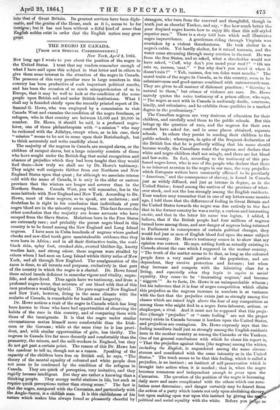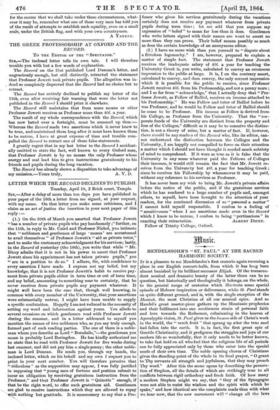THE NEGRO LW CANADA.
[FROM oust SPECIAL CORRESPONDENT.] New York, April 2, 1864. NOT long ago I wrote to you about the position of the negro in the United States. I trust that my readers remember enough of what I have said upon this subject in that letter and in others to give them some interest in the situation of the negro in Canada. The presence of this very peculiar race in large numbers in this country has been productive of such important political results, and has been the occasion of so much misapprehension of us in Europe, that it may be well to look at the condition of the same people upon British soil and under British institutions. What I shall say is founded chiefly upon the recently printed report of Dr. Samuel G. Howe, who was employed by a commission to visit Canada West and examine the conffition of the negro freedmen, or refugees, who in that country are between 15,000 and 20,000 in number. Dr. Howe, it should be said, is a professed negro- lover, one of those philanthropists with " a mission" who may be reckoned with the Jellabys, except when, as in his case, their " mission " seems to be not to muse upon their Borioboolagh, but to think accurately and write candidly about it.
The majority of the negroes in Canada are escaped slaves, or the children of escaped slaves, but a large minority consists of those who have sought under the British flag that social recognition and absence of prejudice which they had been taught that they would find there—how truly we shall see by Dr.' Howe's testimony. They might well emigrate thither from eur Northern and New England States upon that quest ; for although we associate intense cold with the name of Canada, it is only in the older or eastern province that the winters are longer and severer than in the Northern States. Canada West, you will remember, lies in the same latitude with New England and New York. According to Dr. Howe, most of these negroes, so to speak, are mulattoes ; and doubtless he is right in bis conclusion that individuals of pure negro blood are in the minority among them. This fact favours the other conclusion that the majority are house servants who have escaped from the Slave States. Mulattoes born in the Free States are extremely rare ; and probably the purest negro blood in this country is to be found among the New England and Long Island negroes. I have seen in Cuba hundreds of negroes whose gashed cheeks and saw-filed teeth gave unmistakeable evidence that they were born in Africa ; and in all their distinctive traits, the coal- black skin, splay foot, crooked shin, everted blubber-lip, knotty woollen hair, and strong odour, these negroes were rivalled by others whom I had seen on Long Island within thirty miles of New York, and all through New England. The amalgamation of the races is done, to all intents and purposes, exclusively in that part of the country in which the negro is a chattel. Dr. Howe found these mixed breeds deficient in muscular vigour and vitality, unpro- lific, and short-lived. Thus again have we testimony, and from a professed negro-lover, that mixture of our blood with that of this race produces a weakling hybrid. The pure negro of New England and New York, however, living in the same climate with the mulatto of Canada, is remarkable for health and longevity.
Dr. Howe notices a trait of the negro in Canada which has long been known to those who have had opportunities of observing the habits of the race in this country, and of comparing them with those of the immigrants. It is that the negro under similar circumstances makes himself more comfortable than the Irish- man, or the German ; while at the same time he is less provi- dent, and, with similar opportunities of gain, less thrifty. The negroes in Canada live far more decently and comfortably than the peasantry, the miners, and the mill-workers in England, but they do not get past a certain point. The reason of this Dr. Howe has the candour to tell us, though not as a reason. Speaking of the capacity of the children born free on British soil, he says, " The theory of the mental equality of coloured and white people does not seem to be confirmed by the condition of the refugees in Canada. They are quick of perception, very imitative, and they rapidly become intelligent. But they are rather a knowing than a thinking people. They occupy useful stations in life, but such as require quick perceptions rather than strong sense." The fact is that the negro, compared with the Caucasian, and particularly with the Anglo-Saxon, is a childish man. It is this childishness of his nature which makes him always found so pleasantly cheerful by
strangers, who turn from the reserved and thoughtful, though in truth just as cheerful Yankee, and say, "See how much better the poor despised negro knows how to enjoy life than this self-styled superior race." There is a story told here which well illustrates negro improvidence. A gentleman riding through Virginia was overtalcen by a violent thunderstorm. He took shelter in a negro's cabin. Yet hardly shelter, for it rained torrents, and the water came streaming through many crevices in the roof. He was from the free States, and so'asked, what a slaveholder would not have asked, "Cuff, why don't you mend your roof?'' " Oh um rain so, maussa, 'cant." " But why don't you mend it when it doesn't rain ?" " Yah, *mauasa, den um dohn want mendin." The moral traits of the negro in Canada, as in this country, seem to be submissiveness and good-nature combined with untrustworthiness. They are given to all manner of dishonest practices ; "thieving is natural to them," but crimes of violence are rare. Dr. Howe naively quotes the naive testimony of a prison officer, who says, " The negro as met with in Canada is uniformly docile, courteous, kindly, and submissive, and he exhibits those qualities in a marked degree in the penitentiary."
The Canadian negroes are very desirous of education for their children, and carefully send them to the public schools. But this brings up the question of race, and the negroes for their own comfort have asked for, and in some places obtained, separate schools. In others they persist in sending their children to the public schools ; whereupon, in spite of the frequent declaration of the British lion that he is perfectly willing that his mane should become woolly, the Canadians resist the negroes, and declare that white and negro children shall not mingle, and there are hot blood and law-suits. In fact, according to the testimony of this pro- fessed negro-lover, who is one of the people who declare that there is no inherent aversion to the negro in our race, the very prejudice which European writers have constantly affirmed to be peculiarly "American," and the consequence of slavery, is found in Canada just as widely diffused, and just ss intense in degree, as in the United States ; found among the natives of the province of what- ever stock, and not the less strongly among the English residents. Your readers may remember that in one of my letters some months ago, I told them that the difference of feeling in Great Britain and the United States towards the negro was due entirely to the fact that in the former country he was a rarity, a curious and interesting exotic, and that in the latter his name was legion. I added, I believe, that if the British people had four millions of negroes turned loose among them, and saw danger of negroes being returned to Parliament in consequence of certain political changes, they would feel just as men of English blood feel upon the same subject in this country. Dr. Howe's testimony comes in to show that my opinion was correct. He says, setting forth as actually existing in Canada almost the case which I supposed in the mother country, "The truth of the matter seems to be that, as long as the coloured people form a very small portion of the population, and are dependent, they receive protection and favours ; but when they increase and compete with the labouring class for a living, and especially when they begin to aspire to social equality, they cease • to be interesting negroes,' and become 'riggers." As to facts, Dr. Howe is an unimpeachable witness ; but his inference that it is fear of negro competition which elicits this prejudice as the negroes increase in numbers is at variance with the fact that the prejudice exists just as strongly among the classes which are raised high above the fear of any competition as among those who might find in a negro farm-labourer, artizan, or shopkeeper, a rival. And it must not be supposed that this preju- dice (though " prejudice " or " caste feeling " are not the proper terms) exists in Canada because it borders upon the United States, and prejudices are contagious. Dr. Howe expressly says that the feeling manifests itself just as strongly among the English residents born in the mother country as among the Canneks or the Yankees. One of ten general conclusions with which he closes his report is, " That the prejudice against them [the negroes] among the whites, including the English, is engendered among the same circum- stances and manifested with the same intensity as in the United States." The truth seems to be that this feeling, which is called a prejudice, is an instinct ; an instinct of self-preservation which is brought into action when it is needed ; that is, when the negro becomes numerous and independent enough to press upon the
Caucasian. The question of the position of the negro is becoming daily more and more complicated with the others which our revo- lution must determine ; and danger certainly may be feared from the action of a party which insists not only upon abolishing alai(
but upon making open war upon this instinct by giving the o
political and social equality with the white. Before you e us for the course that we shall take under these circumstances, what- ever it may be, remember what one of these very men has told you of the result of attempts to establish such equality,, even on a small scale, under the British flag, and with your own countrymen.
A YANKEE.































 Previous page
Previous page